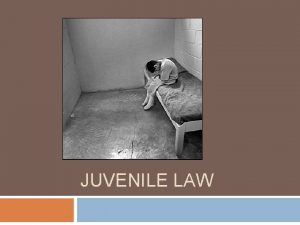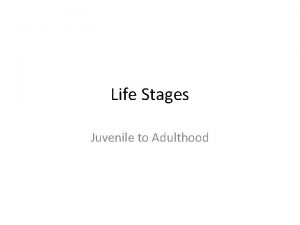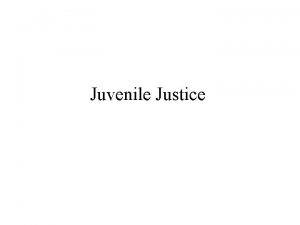Presentation Slides to Accompany Introduction to the Juvenile





- Slides: 5

Presentation Slides to Accompany Introduction to the Juvenile Justice System © 2017 Street Law, Inc. Introduction to the Juvenile Justice System

Presentation Slide A Lesson Outcomes As a result of this lesson, you will be able to: 1. Define the terms appeal, charges, delinquent, due process, hearing, juvenile detention center, record, and testify; 2. Evaluate the fairness of the treatment of a juvenile during a judicial proceeding; 3. Explain “due process of law” and describe the protections provided to individuals by the 14 th Amendment to the U. S. Constitution; 4. Describe the due process rights of youths in the juvenile justice system; and 5. Summarize the juvenile justice processes and procedures. © 2017 Street Law, Inc. Introduction to the Juvenile Justice System

Presentation Slide B (slide 1 of 2) Juvenile Due Process Rights “… nor shall any State deprive any person of life, liberty, or property, without due process of law. ” –The 14 th Amendment to the U. S. Constitution © 2017 Street Law, Inc. Introduction to the Juvenile Justice System

Presentation Slide B (slide 2 of 2) Juvenile Due Process Rights Juveniles in the juvenile justice system have the following due process rights: • Right to notice of charges: A juvenile must be told exactly what they are accused of far enough in advance of their hearing to be able to prepare their case. • Right to counsel: A juvenile must be told they have a right to a lawyer and that if they don’t have enough money to pay, the court must appoint a lawyer for them. • Right to confront and cross examine witnesses: A juvenile is entitled to hear the testimony of the witnesses and their accusers. Cross-examination provides the accused or the lawyer for the accused the chance to ask the witness questions that challenge the reliability of their testimony. • Privilege against self-incrimination: A juvenile must be told they have a right to remain silent because anything they say may be used against them. © 2017 Street Law, Inc. Introduction to the Juvenile Justice System

Presentation Slides to Accompany Introduction to the Juvenile Justice System © 2017 Street Law, Inc. Introduction to the Juvenile Justice System









